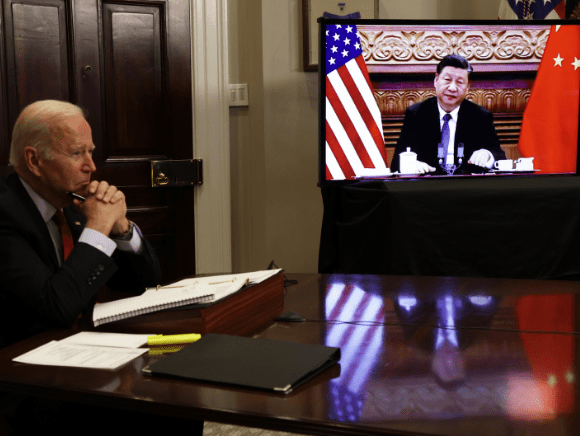President Joe Biden and his administration have been coy about how they will handle China. Many prepared speeches and off-the-cuff remarks have been vague, noting the necessity to improve relations and enhance ties, whether it is on the trade front or the geopolitical file. Biden and Chinese President Xi Jinping held a virtual meeting on Nov. 16, the closest form of official communication between the two nations since the U.S. leader took office in January. What happened at this summit, and will it clear up the confusion over the administration’s agenda on Beijing?
Biden, Xi Exchange Pleasantries
According to the White House readouts of the meeting’s opening comments, President Xi noted that he was “very happy” to see his “old friend.” President Biden stated that they “have never been that formal with one another,” adding that their main focus was “to be clear and honest where we disagree.” The U.S. and Chinese leaders agreed that they need to “work together where our interests intersect,” particularly on climate change.
 “Our responsibility as leaders of China and the United States is to ensure that the competition between our countries does not veer into conflict, whether intended or unintended,” Biden explained. “Just simple, straightforward competition.”
“Our responsibility as leaders of China and the United States is to ensure that the competition between our countries does not veer into conflict, whether intended or unintended,” Biden explained. “Just simple, straightforward competition.”
“And I think it’s very important, as I’ve told other world leaders when they ask about our relationship, is that we have always communicated with one another — with one another very honestly and candidly,” the U.S. president also stated. “We never walk away wondering what the other man is thinking.”
Xi agreed, expressing “his readiness to work with President Biden” to establish a consensus, find common ground, and settle disputes “to move China-U.S. relations forward in a positive direction.” The Chinese Communist Party (CCP) head also outlined “three principles” to enhance U.S.-China relations moving forward: mutual respect, peaceful coexistence, and win-win cooperation.
Officials from both countries attended the meeting. Vice Premier Liu He, Foreign Minister Wang Yi, and Vice Foreign Minister Xie Feng joined the summit on the Chinese side. On the American end, Treasury Secretary Janet Yellen, Secretary of State Antony Blinken, and National Security Advisor Jake Sullivan were among several U.S. representatives to be in attendance.
The White House did not issue an official news release following the four-hour meeting that ended at about 11:30 p.m. EST. However, China’s Foreign Ministry Spokesperson Hua Chunying noted on Twitter that the virtual gathering was “wide-ranging, in-depth, candid, constructive, substantive and productive.” It is unclear what was discussed and agreed upon, although a couple of senior U.S. senior administration officials told reporters that tariffs would not be at the top of the agenda.
How Is Biden Handling China?
Xi and Biden have spoken twice since January as the Chinese president has refrained from making overseas trips since the beginning of the COVID-19 public health crisis. Behind the scenes, the Secretary of State and the top trade negotiator have done most of the talking.
In October, U.S. Trade Representative (USTR) Katherine Tai hosted “frank” virtual talks with Vice Premier Liu He to determine if bilateral engagement could resolve Washington’s consternation surrounding Beijing’s trade and subsidy policies. She also highlighted her concerns over the country’s “non-market” and “authoritarian state-centric” mechanisms. However, how the Oval Office will proceed with the world’s second-largest economy on tariffs, trade, and the trade deal established under former President Donald Trump is still unknown.
Blinken has spoken a few times with China since arriving at the State Department, including a recent call with Foreign Minister Wang Yi. The official communication involved discussions about Taiwan. “The Secretary emphasized long-standing U.S. interest in peace and stability across the Taiwan Strait and expressed concern regarding the PRC’s continued military, diplomatic, and economic pressure against Taiwan,” the State Department noted in a news release.
The Known Unknowns
As former Defense Secretary Donald Rumsfeld stated in 2003: “As we know, there are known knowns; there are things we know we know. We also know there are known unknowns…” Is this the basis of how the administration is grappling with Beijing as it has yet to construct a detailed blueprint for the Red Dragon? With nearly a year since Inauguration Day, there are more questions than answers, and the little pieces scattered throughout the Washington establishment have yet to provide a straightforward course of action. Perhaps more details of the Xi-Biden virtual summit will be released in the coming days to give the American people something to ponder.
~ Read more from Andrew Moran.





